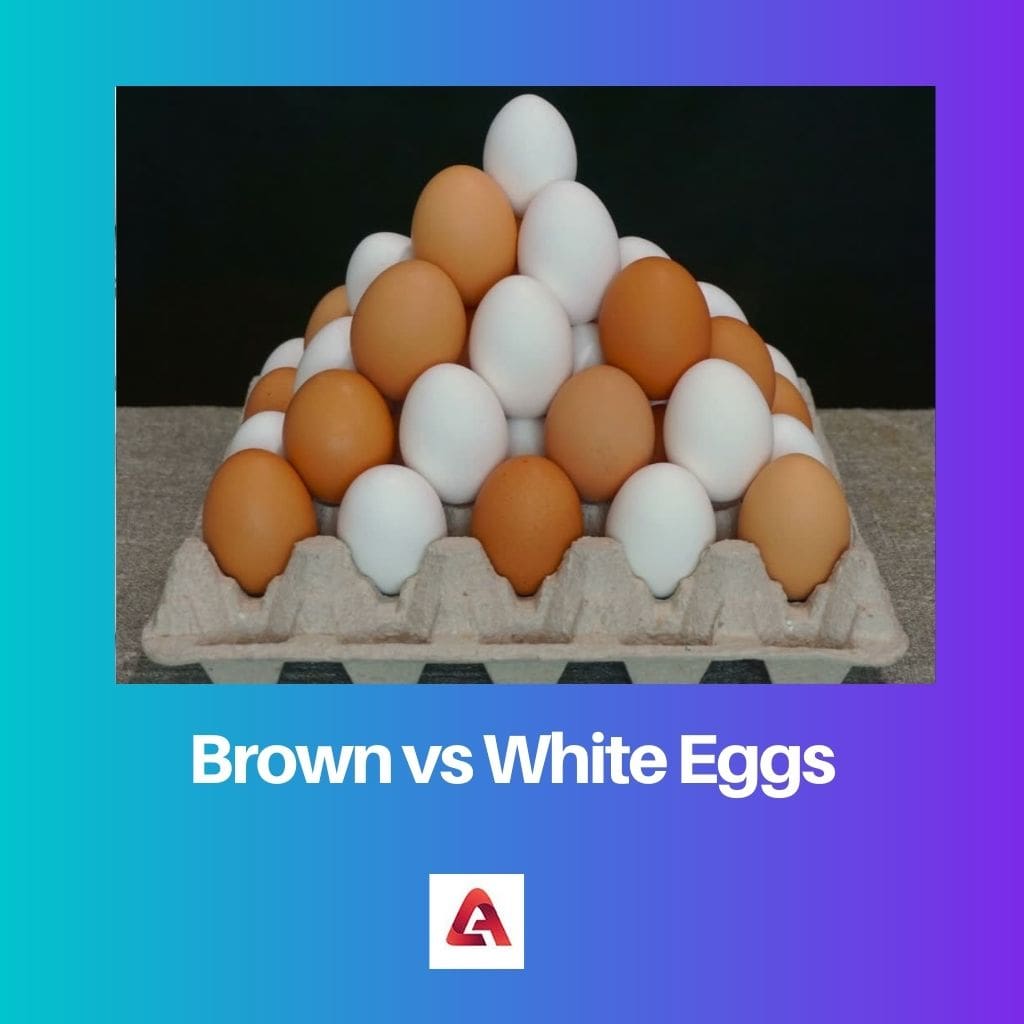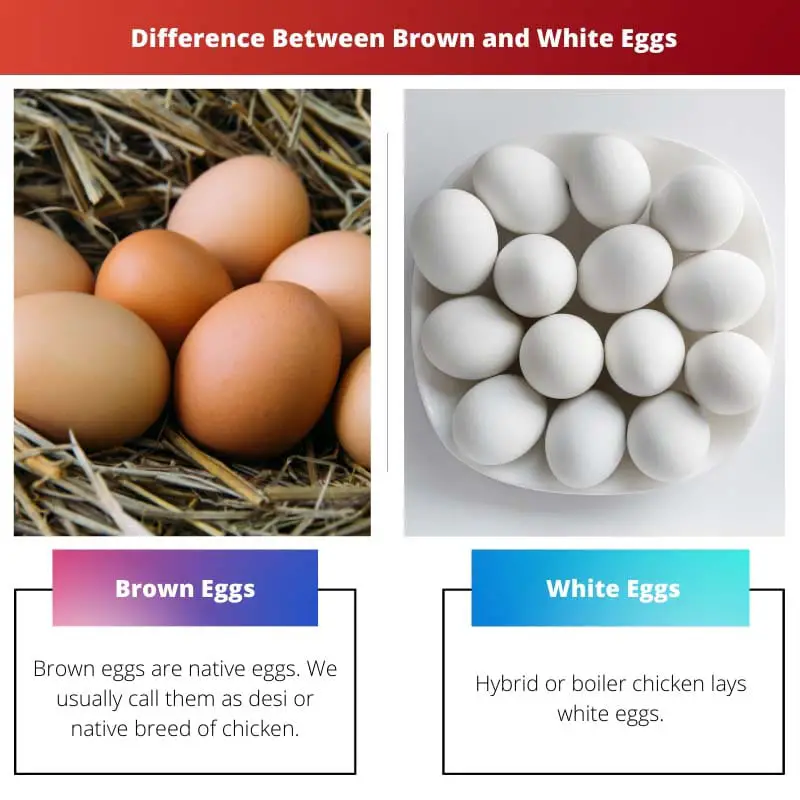Brown eggs and white eggs differ primarily in the breed of the hen that lays them, with brown eggs coming from breeds like Rhode Island Reds and white eggs from breeds like Leghorns. Nutritionally, there’s no significant difference between them; the color variation is purely cosmetic.
Key Takeaways
- Brown eggs are laid by chickens with red earlobes, while chickens lay white eggs with white earlobes.
- Brown eggs are sometimes considered healthier or more natural than white eggs, but no scientific evidence supports this claim.
- Brown eggs are more expensive than white eggs due to higher production costs.
Brown vs White Eggs
The difference between a brown and a white egg is that the hens with white feathers lay white eggs, and those with brown features lay brown eggs.

Eggs are suitable for the brain, hair, memory, and cognition. Also, brown and white eggs are rich in protein and amino acids and an excellent source of minerals, beta carotene.
To know more about the nutrition facts of eggs, check out this link.
Did you know eggs contain all the needed vitamins except vitamin C?
Comparison Table
| Feature | Brown Eggs | White Eggs |
|---|---|---|
| Shell Color | Brown (various shades) | White |
| Cause of Shell Color | Pigment (protoporphyrin IX) produced by hens with red or brown earlobes and feathers | No pigment produced by hens with white earlobes and feathers |
| Nutrition | No significant difference | No significant difference |
| Protein | Around 6 grams per egg | Around 6 grams per egg |
| Calories | Around 70 calories per egg | Around 70 calories per egg |
| Taste | May have slight variations depending on hen’s diet | May have slight variations depending on hen’s diet |
| Price | May be slightly more expensive due to perceived quality | Typically less expensive |
| Other Factors Affecting Quality | Hen’s breed, diet, housing conditions | Hen’s breed, diet, housing conditions |
What is Brown Egg?
Brown eggs are laid by hens of specific breeds, such as Rhode Island Reds, Marans, and Orpingtons. These breeds produce eggs with brown shells due to genetic factors. The pigment responsible for the brown coloration is called protoporphyrin, which is deposited on the eggshell during the final stages of egg formation in the hen’s oviduct.
Nutritional Content
Contrary to common misconception, the color of the eggshell does not significantly affect its nutritional content. Brown eggs contain the same essential nutrients as white eggs, including protein, vitamins, and minerals. The nutritional value of an egg is primarily determined by the hen’s diet and living conditions rather than the color of the shell.
Market Demand and Consumer Preference
Brown eggs are associated with organic or free-range farming practices, leading some consumers to perceive them as healthier or more natural. Consequently, they may be priced slightly higher than white eggs in some markets. However, from a nutritional standpoint, there is no inherent superiority of brown eggs over white eggs.

What is White Egg?
White eggs are predominantly laid by hens of specific breeds, such as Leghorns and Anconas. These breeds have been selectively bred to produce eggs with white shells. The absence of pigments like protoporphyrin in the oviduct results in the formation of white eggshells.
Nutritional Content
Like brown eggs, the nutritional composition of white eggs is similar and equally beneficial. They contain high-quality protein, essential vitamins such as B12 and D, and important minerals like selenium and choline. The nutritional value of eggs is primarily determined by factors such as the hen’s diet and living conditions rather than the color of the shell.
Market Demand and Consumer Preference
White eggs are perceived as a more economical choice and are priced lower than brown eggs in many markets. They are also commonly used in commercial egg production due to the efficiency of breeds like Leghorns in laying white eggs. Despite misconceptions, white eggs offer the same nutritional benefits as brown eggs.
Dispelling Myths
Contrary to popular belief, the color of the eggshell does not indicate the nutritional quality or taste of the egg. White eggs are not inferior to brown eggs in any nutritional aspect. The preference for brown eggs over white eggs is influenced by cultural factors, marketing strategies, or misconceptions rather than objective nutritional differences.

Main Differences Between Brown and White Eggs
- Hen Breed:
- Brown eggs are laid by breeds like Rhode Island Reds, Marans, and Orpingtons.
- White eggs are predominantly laid by breeds such as Leghorns and Anconas.
- Eggshell Color:
- Brown eggs have shells with a brown hue due to the presence of pigments like protoporphyrin.
- White eggs have shells devoid of such pigments, resulting in a white appearance.
- Market Perception:
- Brown eggs are associated with organic or free-range farming practices, leading some consumers to perceive them as healthier or more natural.
- White eggs are commonly perceived as a more economical choice and are priced lower in many markets.
- Nutritional Content:
- Both brown and white eggs offer similar nutritional benefits, including high-quality protein, essential vitamins (such as B12 and D), and minerals like selenium and choline.
- The nutritional value of eggs is primarily determined by factors such as the hen’s diet and living conditions rather than the color of the shell.




